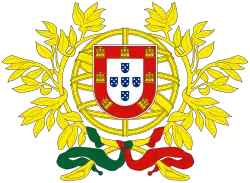Marcelo Rebelo de Sousa
Marcelo Nuno Duarte Rebelo de Sousa GColTE ComSE GCIH (Portuguese pronunciation: [mɐɾˈsɛlu ˈnunu ˈðwaɾtɨ ʁɨˈβelu ðɨ ˈsozɐ]; born 12 December 1948) is a Portuguese politician and academic. He is the 20th and current president of Portugal, since 9 March 2016.[1] He is a member of the Social Democratic Party, though he suspended his party membership for the duration of his presidency.[2] Rebelo de Sousa has previously served as a government minister, parliamentarian in the Assembly of the Portuguese Republic, legal scholar, journalist, political analyst, law professor, and pundit.
Marcelo Rebelo de Sousa | |
|---|---|
.jpg.webp) Rebelo de Sousa in 2017 | |
| 20th President of Portugal | |
| Assumed office 9 March 2016 | |
| Prime Minister | António Costa |
| Preceded by | Aníbal Cavaco Silva |
| President of the Social Democratic Party | |
| In office 31 March 1996 – 1 May 1999 | |
| Secretary-General | Rui Rio Carlos Horta e Costa António Capucho Artur Torres Pereira |
| Preceded by | Fernando Nogueira |
| Succeeded by | José Manuel Barroso |
| Leader of the Opposition | |
| In office 31 March 1996 – 1 May 1999 | |
| Prime Minister | António Guterres |
| Preceded by | Fernando Nogueira |
| Succeeded by | José Manuel Barroso |
| Minister of Parliamentary Affairs | |
| In office 12 June 1982 – 9 June 1983 | |
| Prime Minister | Francisco Pinto Balsemão |
| Preceded by | Fernando Amaral |
| Succeeded by | António de Almeida Santos |
| Secretary of State for the Presidency of the Council of Ministers | |
| In office 4 September 1981 – 10 June 1982 | |
| Prime Minister | Francisco Pinto Balsemão |
| Preceded by | José Luís da Cruz Vilaça |
| Succeeded by | Leonor Beleza |
| Member of the Assembly of the Republic | |
| In office 2 June 1975 – 2 April 1976 | |
| Constituency | Lisbon |
| Personal details | |
| Born | Marcelo Nuno Duarte Rebelo de Sousa 12 December 1948 Lisbon, Portugal |
| Political party | Social Democratic Party (1975–present) |
| Spouse | |
| Domestic partner | Rita Amaral (1981–present) |
| Children | 2 |
| Relatives | Baltasar Rebelo de Sousa (father) |
| Residence(s) | Belém Palace (official) Cascais (private) |
| Signature | |
Early life
Born in Lisbon, Marcelo Rebelo de Sousa is the eldest son of Baltasar Rebelo de Sousa (1921–2001) and his wife Maria das Neves Fernandes Duarte (1921–2003). He has claimed that his mother had Jewish ancestry.[3] He is named after his godfather, Marcello Caetano, the last prime minister of the Estado Novo regime.
Marcelo Rebelo de Sousa became a professor and publicist specialized in constitutional law and administrative law, earning his doctorate at the University of Lisbon, where he taught law.[4]
Party politics and academic career
Marcelo Rebelo de Sousa started his career during the Estado Novo as a lawyer, and later as a journalist.[5] He joined the Popular Democratic Party, becoming a Deputy to the Assembly of the Republic.[6] During that time, he helped draft Portugal's constitution in 1976.[7] Later he rose to Minister of Parliamentary Affairs under Prime Minister Francisco Pinto Balsemão.[8] Together with him he was a co-founder, Director and Administrator of the Expresso newspaper,[5] owned by Pinto Balsemão. He was also a founder of Sedes.[9] He worked with another newspaper, Semanário, between 1983 and 1987.[5] He started as a political analyst and pundit on the radio broadcaster TSF with his Exams,[5] in which he gave marks (0 to 20) to the main political players.
In 1989 he ran for President of the Municipal Chamber of Lisbon (Mayor of Lisbon) but lost to Jorge Sampaio, though he did win a seat as City Councilor (Vereador).[10] In that campaign he took a plunge into the waters of the Tagus River to prove they were not polluted despite claims to the contrary.[11] In other local elections, he also became the President of the Municipal Assembly of Cascais (1979–1982)[12] and the President of the Municipal Assembly of Celorico de Basto (1997–2009).[13]
Leader of the PSD, 1996–1999
Rebelo de Sousa was the leader of the Social Democratic Party from 29 March 1996 to 27 May 1999.[6] He created a center-right coalition, the Democratic Alliance, with the People's Party in 1998. He became, however, the Vice-President of the European People's Party–European Democrats. The coalition did not please large parts of its own party, due to the role the People's Party leader, Paulo Portas, had in undermining Aníbal Cavaco Silva's government while director of the weekly O Independente.
Post-leadership
He had a weekly program of political analysis every Sunday on public TV station RTP after previously having a similar program on the private TV station TVI. President Jorge Sampaio dissolved the Assembly of the Republic, a move that also meant dismissing the Government at a time when it had a stable coalition majority, and calling for anticipated elections, which led to the defeat of Santana Lopes and the election of the Socialists under José Sócrates.

In 2010, he left RTP and returned to TVI to do the same program that he had before.
He was made a Member of the Council of State, by President Aníbal Cavaco Silva, and was sworn in on 6 April 2006.[14]
He was a leading figure on the anti-abortion side of the 2007 abortion referendum. He even founded a website titled "Assim Não" (Not like this), which was divulged with a famous introductory video.[15] It became so well known that it was parodied in Saturday Night Live-fashion by famous humour group Gato Fedorento.[16]
President of Portugal, 2016–present
On 24 January 2016, Marcelo Rebelo de Sousa was elected as President of Portugal in the first round of voting. He stood as an independent, appealing for moderation and cross-party consensus.[17] During his election campaign, he promised to repair political divisions and the hardship of Portugal's 2011–14 bailout. Unlike his predecessor, Aníbal Cavaco Silva, he had never previously held a top state position.[18]
In March 2020, Marcelo Rebelo de Sousa asked parliament to authorize a state of emergency to contain the COVID-19 pandemic; this marked the first time the country declared a state of emergency nationwide in 46 years of democratic history.[19]
In December 2020, Marcelo Rebelo de Sousa announced his intention to run for office again in the 2021 Portuguese presidential election.[20] Marcelo was re-elected president in January 2021, with 60.7% of the votes, the third highest vote margin ever in presidential elections in Portugal since the Carnation Revolution. He was also the first candidate ever to win the vote in all municipalities, ranging from 51.3% in the Beja District to 72.16% in Madeira.[21]
State visits

.jpg.webp)
.png.webp)
Marcelo Rebelo de Sousa, as President of Portugal, has visited the Vatican, Spain, Mozambique, Morocco, Brazil, Switzerland, Cuba, United Kingdom, Greece, United States of America and Angola. The first visit was to the Vatican City to meet the Pope Francis and the Cardinal Secretary of State Pietro Parolin.[22][23][24][25][26][27][28] In 2019, he joined President Emmanuel Macron for the traditional Bastille Day military parade in Paris, which honoured European military cooperation and the European Intervention Initiative that year.[29]
Health
In December 2017, Marcelo Rebelo de Sousa underwent emergency surgery at Curry Cabral Hospital in order to treat an incarcerated umbilical hernia.[30][31] The procedure was performed by Eduardo Barroso, a friend of the president.[32] He was discharged from the hospital and lauded the Portuguese National Health Service, considering it an important achievement of Portuguese democracy.[33]
In June 2018, Marcelo Rebelo de Sousa was briefly hospitalized after he collapsed after a visit to Bom Jesus do Monte sanctuary in Braga; the incident was caused by a sudden drop in blood pressure alongside acute gastroenteritis.[34][35]
In October 2019, he underwent planned cardiac catheterization at Santa Cruz Hospital, Carnaxide, in the outskirts of Lisbon, after accumulated calcium was detected in one of his coronary arteries.[36]
On 8 March 2020, Marcelo Rebelo de Sousa suspended all his public agenda and returned to his private home in Cascais, entering a voluntary quarantine period for 14 days after being revealed that a group of students from Felgueiras, who had visited Belém Palace some days before, had also been quarantined after a positive case of COVID-19 was detected in their school.[37] Marcelo subsequently tested negative for the virus and worked remotely for a period during the COVID-19 pandemic.[38][39][40][41][42]
.jpg.webp)
On 11 January 2021, Marcelo Rebelo de Sousa tested positive for COVID-19, after a contact with a positive case in his staff. He was reportedly asymptomatic, and canceled his appointments, opting to remain in self-isolation.[43] Three further COVID-19 tests yielded negative results.[44] Some physicians said that a false positive PCR-RT test, although possible, was unlikely,[44] and tentatively attributed the subsequent negative tests to a low viral load.[45] On 13 January, however, the Lisbon and Tagus Valley regional public health authority confirmed that the President was considered to have had a low-risk exposure, and was therefore simply under passive surveillance for two weeks: the President was instructed that he could resume his agenda save for any events in crowded public places.[46]
In December 2021, he underwent planned surgery to remove two inguinal hernias at the Military Hospital in Lisbon.[47]
On 5 July 2023, Marcelo Rebelo de Sousa collapsed during a visit to the NOVA University School of Science and Technology, in Almada. He was taken to Santa Cruz Hospital "as a precaution". His chief of staff, Fernando Frutuoso de Melo, assured the situation was probably due to the heat and to the President's "heavy schedule". After being submitted to several medical exams, the President was discharged four hours later, with a Holter monitor, and addressed journalists on his way out from the hospital, saying he had had an episode of low blood pressure since he had skipped lunch — as he usually does, replacing it with Fortimel, a medical nutrition supplement — and had been offered a glass of warm moscatel shortly before he fainted that "must have upset, probably, [his] digestion". The physicians recommended rest, though the President's personal physician, Daniel de Matos, remarked their recommendation would in all likelihood fall on deaf ears. His scheduled presence at several events was nonetheless cancelled until 9 July, but the President recorded video messages to be displayed at those events. Only indoor audiences at Belém Palace remained scheduled.[48][49][50][51]
Personal life
On 27 July 1972, Marcelo Rebelo de Sousa married Ana Cristina da Gama Caeiro da Mota Veiga in the parish of São Bento do Mato in Évora. His wife, born on 4 June 1950 in the Santos-o-Velho parish of Lisbon, is the daughter of António da Mota Veiga and Maria Emília da Gama Caeiro. In the following years, Sousa and Mota Veiga had two children:
- Nuno da Mota Veiga Rebelo de Sousa (b. São Sebastião da Pedreira, Lisbon, 8 August 1973) and
- Sofia da Mota Veiga Rebelo de Sousa (b. São Sebastião da Pedreira, Lisbon, 27 September 1976).
The couple separated in 1980 but never got divorced, with Marcelo citing his Roman Catholic faith as the reason behind his wish to keep up the marital bond.[52] He started dating his former student Rita Amaral Cabral in 1981, who at the time was his fellow lecturer at the Faculty of Law of the University of Lisbon.[53] They continue to entertain a casual relationship, but live separately.[54]
Honours and awards
Insignia of Office
 Grand Master of the Honorific Orders of Portugal (2016 – present)
Grand Master of the Honorific Orders of Portugal (2016 – present)
Ancient Military Orders
 Grand Collar of the Military Order of the Tower and Sword (9 March 2021)[55]
Grand Collar of the Military Order of the Tower and Sword (9 March 2021)[55] Commander of the Order of Saint James of the Sword (9 June 1994)[55]
Commander of the Order of Saint James of the Sword (9 June 1994)[55]
National Orders
 Grand Cross of the Order of Prince Henry (9 June 2005)[55]
Grand Cross of the Order of Prince Henry (9 June 2005)[55]
Foreign Orders
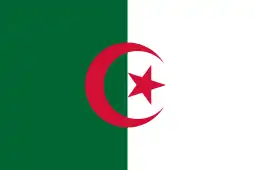 Algeria: Collar of the National Order of Merit (23 May 2023)
Algeria: Collar of the National Order of Merit (23 May 2023)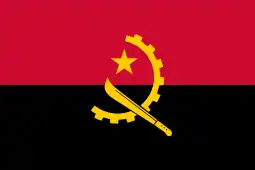 Angola: Collar of the Order of Agostinho Neto (6 March 2019)[56]
Angola: Collar of the Order of Agostinho Neto (6 March 2019)[56] Austria: Grand Star of the Decoration of Honour for Services to the Republic of Austria (18 June 2019)[56]
Austria: Grand Star of the Decoration of Honour for Services to the Republic of Austria (18 June 2019)[56].svg.png.webp) Belgium: Grand Cordon of the Order of Leopold (22 October 2018)[57]
Belgium: Grand Cordon of the Order of Leopold (22 October 2018)[57] Brazil: Grand Collar of the Order of the Southern Cross (22 April 2023)
Brazil: Grand Collar of the Order of the Southern Cross (22 April 2023) Bulgaria: Grand Cross of the Order of the Balkan Mountains (30 January 2019)[56]
Bulgaria: Grand Cross of the Order of the Balkan Mountains (30 January 2019)[56]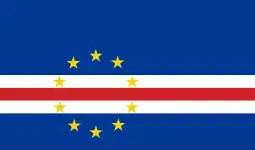 Cape Verde: 1st Class of the Amílcar Cabral Order (10 April 2017)
Cape Verde: 1st Class of the Amílcar Cabral Order (10 April 2017) Chile: Collar of the Order of Merit (30 March 2017)
Chile: Collar of the Order of Merit (30 March 2017) Colombia: Grand Collar of the Order of Boyaca (13 November 2017)
Colombia: Grand Collar of the Order of Boyaca (13 November 2017) Croatia: Grand Cross of the Grand Order of King Tomislav (4 May 2018)[58]
Croatia: Grand Cross of the Grand Order of King Tomislav (4 May 2018)[58]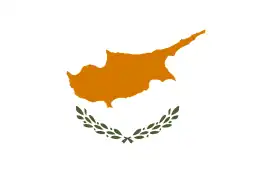 Cyprus: Grand Collar of the Order of Makarios III (8 October 2022)
Cyprus: Grand Collar of the Order of Makarios III (8 October 2022)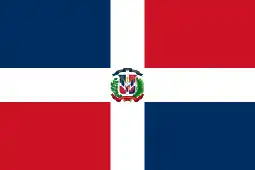 Dominican Republic: Grand Cross with Gold Breast Star of the Order of Merit of Duarte, Sánchez and Mella (23 March 2023)[59]
Dominican Republic: Grand Cross with Gold Breast Star of the Order of Merit of Duarte, Sánchez and Mella (23 March 2023)[59]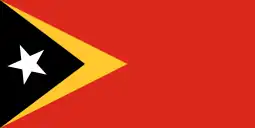 East Timor: Grand Collar of the Order of Timor-Leste (19 May 2022)[60]
East Timor: Grand Collar of the Order of Timor-Leste (19 May 2022)[60]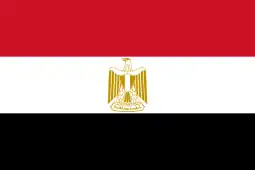 Egypt: Collar of the Order of the Nile (21 November 2016)[56]
Egypt: Collar of the Order of the Nile (21 November 2016)[56] Estonia: Collar of the Order of the Cross of Terra Mariana (10 April 2019)[61]
Estonia: Collar of the Order of the Cross of Terra Mariana (10 April 2019)[61] France: Grand Cross of the National Order of the Legion of Honour (26 August 2016)[62]
France: Grand Cross of the National Order of the Legion of Honour (26 August 2016)[62] Greece: Grand Cross of the Order of the Redeemer (21 April 2017)[63]
Greece: Grand Cross of the Order of the Redeemer (21 April 2017)[63]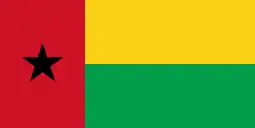 Guinea-Bissau: Collar of the Amílcar Cabral Medal (19 May 2021)
Guinea-Bissau: Collar of the Amílcar Cabral Medal (19 May 2021).svg.png.webp) Holy See: Knight with the Collar of the Order of Pius IX (7 July 2016)[62]
Holy See: Knight with the Collar of the Order of Pius IX (7 July 2016)[62] Hungary: Grand Cross with Chain of the Order of Merit of the Republic of Hungary (23 February 2023)
Hungary: Grand Cross with Chain of the Order of Merit of the Republic of Hungary (23 February 2023) Italy: Knight Grand Cross with Collar of the Order of Merit of the Italian Republic (29 November 2017)[64]
Italy: Knight Grand Cross with Collar of the Order of Merit of the Italian Republic (29 November 2017)[64]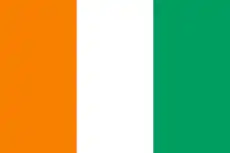 Ivory Coast: Grand Cross of the National Order of the Ivory Coast (12 September 2017)
Ivory Coast: Grand Cross of the National Order of the Ivory Coast (12 September 2017) Latvia: Commander Grand Cross with Chain of the Order of the Three Stars (11 April 2023)[65]
Latvia: Commander Grand Cross with Chain of the Order of the Three Stars (11 April 2023)[65] Luxembourg: Knight of the Order of the Gold Lion of the House of Nassau (23 May 2017)
Luxembourg: Knight of the Order of the Gold Lion of the House of Nassau (23 May 2017)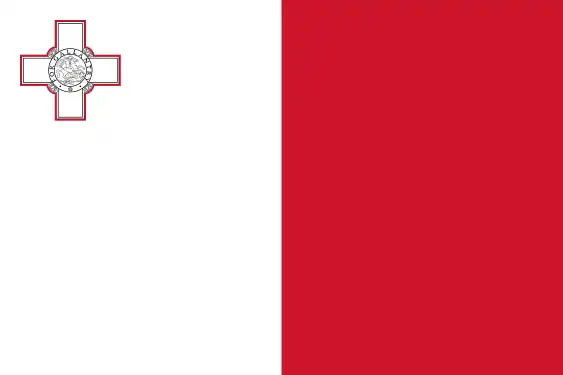 Malta: Honorary Companion of Honour with Collar of the National Order of Merit (15 May 2018)[58]
Malta: Honorary Companion of Honour with Collar of the National Order of Merit (15 May 2018)[58]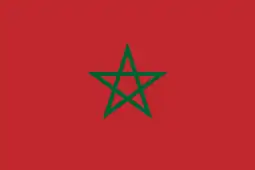 Morocco: Collar of the Order of Muhammad (27 June 2016)[66]
Morocco: Collar of the Order of Muhammad (27 June 2016)[66] Mexico: Collar of the Order of the Aztec Eagle (17 July 2017)[67]
Mexico: Collar of the Order of the Aztec Eagle (17 July 2017)[67] Netherlands: Knight Grand Cross of the Order of the Netherlands Lion (10 October 2017)
Netherlands: Knight Grand Cross of the Order of the Netherlands Lion (10 October 2017)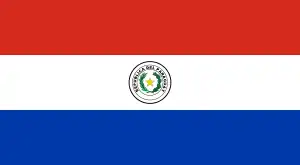 Paraguay: Collar of the National Order of Merit (11 May 2017)
Paraguay: Collar of the National Order of Merit (11 May 2017) Peru: Grand Cross with diamonds of the Order of the Sun of Peru (25 February 2019)
Peru: Grand Cross with diamonds of the Order of the Sun of Peru (25 February 2019) Poland: Knight of the Order of the White Eagle (22 August 2023)[68]
Poland: Knight of the Order of the White Eagle (22 August 2023)[68] Serbia: Second Class of the Order of the Republic of Serbia (25 January 2017)[69]
Serbia: Second Class of the Order of the Republic of Serbia (25 January 2017)[69]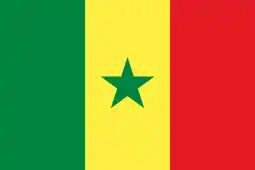 Senegal: Grand Cross of the National Order of the Lion (12 April 2017)
Senegal: Grand Cross of the National Order of the Lion (12 April 2017) Slovenia: Recipient of the Order for Exceptional Merits (31 May 2021)
Slovenia: Recipient of the Order for Exceptional Merits (31 May 2021) Spain:
Spain:
- Collar of the Order of Charles III (13 April 2018)[70]
- Knight of the Collar of the Order of Isabella the Catholic (25 November 2016)[71]
References
- "President says Portugal must respect EU, avoid return to crisis". Reuters. 9 March 2016. Retrieved 25 December 2018 – via www.reuters.com.
- "Marcelo Rebelo de Sousa suspendeu a militância no PSD". Observador. 1 April 2016. Retrieved 13 July 2020.
- Devemos reconhecer e acarinhar a nossa herança judaica, Diário de Notícias Archived 7 March 2020 at the Wayback Machine
- Teaching staff, Faculty of Law, University of Lisbon
- Portuguesa, Presidência da República. "O Presidente". www.presidencia.pt (in Portuguese). Retrieved 22 November 2022.
- "Marcelo Rebelo de Sousa". PSD (in European Portuguese). Retrieved 22 November 2022.
- Vince Chadwick (24 January 2016), Portugal elects Rebelo de Sousa as president Politico Europe.
- Portugal, Grand Union. "Composição". www.historico.portugal.gov.pt (in Portuguese). Retrieved 22 November 2022.
- "MPR - Marcelo Rebelo de Sousa". www.museu.presidencia.pt. Retrieved 22 November 2022.
- "Quando Sampaio conquista Câmara Municipal de Lisboa". www.dn.pt (in European Portuguese). Retrieved 22 November 2022.
- Falcão, Catarina. "Há 25 anos Marcelo deu o mergulho que quase lhe valeu Lisboa". Observador (in European Portuguese). Retrieved 22 November 2022.
- "Marcelo Rebelo de Sousa | Câmara Municipal de Cascais". www.cascais.pt (in European Portuguese). Retrieved 22 November 2022.
- "Presidente vota em Celorico de Basto, primeiro-ministro em Sintra". www.dn.pt (in European Portuguese). Retrieved 22 November 2022.
- "Presidente deu posse a novos membros do Conselho de Estado". Presidência da República Portuguesa. Retrieved 3 February 2018.
- Vídeos Perdidos. "As razões do Assim Não (Marcelo Rebelo de Sousa)". Archived from the original on 13 December 2021. Retrieved 25 December 2018 – via YouTube.
- RTP. "Assim Não (Marcelo Rebelo de Sousa)". Archived from the original on 13 December 2021. Retrieved 25 December 2018 – via YouTube.
- Paul Ames (24 January 2016), 5 takeaways from Portugal’s presidential election Politico Europe.
- Axel Bugge (9 March 2016), "President says Portugal must respect EU, avoid return to crisis" Reuters.
- Victoria Waldersee, Catarina Demony and Sergio Goncalves (18 March 2020), Portugal's president asks parliament to authorise state of emergency due to coronavirus Reuters.
- Catarina Demony (7 December 2020), In a Lisbon bakery, Portugal's president announces run for second term Reuters.
- "Presidenciais distrito a distrito: Marcelo ganha em todos, Ventura é "vice" em 12 (mas Ana Gomes fica à frente em Lisboa e no Porto)". Expresso. Retrieved 29 January 2021.
- "Vaticano: Marcelo Rebelo de Sousa em audiência com o Papa Francisco". Agência Ecclesia (in Portuguese). 17 March 2016. Archived from the original on 30 April 2016. Retrieved 29 June 2016.
- Ribeiro, Nuno (16 March 2016). "Marcelo inicia hoje visita oficial ao Vaticano e Espanha". Público (in Portuguese). Archived from the original on 29 June 2016. Retrieved 29 June 2016.
- "Marcelo chegou a Moçambique". TVI (in Portuguese). 3 May 2016. Archived from the original on 6 May 2016. Retrieved 29 June 2016.
- "Em Marrocos, a falar de energia, 'Brexit', Espanha e sanções". Público (in Portuguese). Lusa. 28 June 2016. Archived from the original on 14 October 2016. Retrieved 29 June 2016.
- "Marcelo Rebelo de Sousa em visita oficial ao Brasil". Rádio e Televisão de Portugal (in Portuguese). Retrieved 20 November 2018.
- Lusa, Agência. "Em visita oficial a Londres, Marcelo Rebelo de Sousa encontra-se com financeiros e primeira-ministra". Observador (in European Portuguese). Retrieved 20 November 2018.
- "Portugal's President Marcelo Rebelo de Sousa visits Greece | The Greek Observer". The Greek Observer. 13 March 2018. Retrieved 20 November 2018.
- Bate Felix and Caroline Pailliez (14 July 2019), European leaders join Macron for Bastille Day parade Reuters.
- "Marcelo Rebelo de Sousa internado em Lisboa para ser operado de urgência". www.dn.pt (in Portuguese). Diário de Notícias. Retrieved 30 December 2017.
- "Boletim Clínico do estado de saúde do Presidente da República". www.presidencia.pt (in Portuguese). Presidência da República. Retrieved 30 December 2017.
- "Marcelo operado por Eduardo Barroso". www.sabado.pt (in Portuguese). SÁBADO. Retrieved 30 December 2017.
- "Marcelo Rebelo de Sousa já teve alta e foi aplaudido à saída". www.dn.pt (in Portuguese). Diário de Notícias. Retrieved 1 January 2018.
- "Marcelo sofre quebra de tensão e desmaia durante visita em Braga". www.jn.pt (in Portuguese). Jornal de Notícias. Retrieved 23 June 2018.
- "Nota da Presidência da República". www.presidencia.pt (in Portuguese). Presidência da República. Retrieved 23 June 2018.
- "Marcelo Rebelo de Sousa no hospital para intervenção cirúrgica". www.jornaldenegocios.pt (in Portuguese). Lusa. Retrieved 24 April 2021.
- "Marcelo dá o exemplo e entra em quarentena". www.jornaldenegocios.pt (in Portuguese). Jornal de Negócios. Retrieved 10 March 2020.
- "Covid-19: Teste a Marcelo Rebelo de Sousa deu negativo". www.sicnoticias.pt (in Portuguese). SIC Notícias. Retrieved 10 March 2020.
- "Covid-19: segundo teste a Marcelo deu negativo". www.tsf.pt (in Portuguese). TSF. 17 March 2020. Retrieved 12 April 2020.
- "Marcelo regressa a Belém para assumir responsabilidades com o Governo". www.publico.pt (in Portuguese). PÚBLICO. Retrieved 12 April 2020.
- "Reunião em Belém. Centeno avalia com Marcelo consequências da pandemia covid-19". www.rtp.pt (in Portuguese). RTP. Retrieved 12 April 2020.
- "Covid-19: Presidente da República revela que fez teste sorológico e não está imunizado". www.visao.pt (in Portuguese). Visão. 7 April 2020. Retrieved 12 April 2020.
- "Marcelo acusou positivo à covid-19 mas está assintomático" [Marcelo tests positive for COVID-19, but is asymptomatic]. Público (in Portuguese). 11 January 2021. Retrieved 11 January 2021.
- "Covid-19: Terceiro teste a Marcelo com resultado negativo" [Covid-19: negative result on Marcelo's third test]. Expresso (in Portuguese). 12 January 2021. Retrieved 2 September 2021.
- "Positivo é positivo: Marcelo está infetado, diz patologista" [Positive is positive: Marcelo has been infected, says pathologist]. Jornal de Notícias (in Portuguese). 12 January 2021. Retrieved 2 September 2021.
- "Presidente da República regressou ao Palácio de Belém" [The President of the Republic has returned to Belém Palace]. Presidency of the Republic (in Portuguese). 13 January 2021. Retrieved 2 September 2021.
- "Marcelo operado "com sucesso" a duas hérnias inguinais. "Prevê-se alta dentro de 24 horas"". www.dn.pt (in Portuguese). DN/Lusa. Retrieved 24 April 2021.
- "Quem, o quê, onde, quando, como - só ainda não se sabe exatamente o porquê: Marcelo, o relato do desmaio e da hospitalização". CNN Portugal (in Portuguese). 5 July 2023. Retrieved 6 July 2023.
- "Marcelo sai do hospital animado e conta que disse a Costa: "Ainda não é desta que morro"". Diário de Notícias (in Portuguese). 5 July 2023. Retrieved 6 July 2023.
- "Fortimel, moscatel e um Holter: Marcelo explica a "quebra de tensão repentina" que o fez desmaiar". Expresso (in Portuguese). 5 July 2023. Retrieved 6 July 2023.
- "Presidente da República cancela deslocações até domingo, mas assegura agenda através de mensagens de vídeo". Lusa (in Portuguese). 6 July 2023. Retrieved 7 July 2023.
- Valente, Liliana. "Marcelo. O show do comentador acaba em Belém?". Observador (in European Portuguese). Retrieved 5 December 2019.
- "Biografia de Marcelo Rebelo de Sousa. Rita, a eterna namorada". www.sol.pt. Revista Sol. Retrieved 26 November 2022.
- "Quem é a Mulher Que não quer ser primeira-dama?". www.sabado.pt. Revista Sábado. Retrieved 12 March 2016.
- "Cidadãos Nacionais Agraciados com Ordens Portuguesas". Página Oficial das Ordens Honoríficas Portuguesas. Retrieved 18 October 2021.
- "Página Oficial da Presidência da República Portuguesa". www.presidencia.pt. Retrieved 18 April 2019.
- "La reina Matilde de Bélgica, una burbuja Freixenet en su cena de gala en Portugal". El Confidencial. 23 October 2018. Retrieved 25 December 2018.
- "CIDADÃOS NACIONAIS AGRACIADOS COM ORDENS ESTRANGEIRAS – Página Oficial das Ordens Honoríficas Portuguesas". www.ordens.presidencia.pt (in Portuguese). Retrieved 27 July 2018.
- "President of the Republic began the official visit to the Dominican Republic". www.presidencia.pt. Retrieved 21 April 2023.
- "Presidente da República condecorado em Timor-Leste". Presidente da República Portuguesa. 19 May 2022. Retrieved 20 May 2022.
- "Vabariigi President". president.ee. Retrieved 18 April 2019.
- "CIDADÃOS NACIONAIS AGRACIADOS COM ORDENS ESTRANGEIRAS". Página Oficial das Ordens Honoríficas Portuguesas. Retrieved 8 January 2017.
- "CIDADÃOS NACIONAIS AGRACIADOS COM ORDENS ESTRANGEIRAS – Página Oficial das Ordens Honoríficas Portuguesas". www.ordens.presidencia.pt (in Portuguese). Retrieved 22 February 2018.
- "Le onorificenze della Repubblica Italiana". www.quirinale.it. Retrieved 25 December 2018.
- "Par apbalvošanu ar Triju Zvaigžņu ordeni - Latvijas Vēstnesis".
- HM the King, Portuguese President Hold Tête-à-Tête Talks – website of Ministry of Culture and Communication of the Kingdom of Morocco
- "ACUERDO por el que se otorga la Condecoración de la Orden Mexicana del Águila Azteca, en grado de Collar, al Excelentísimo Señor Marcelo Nuno Duarte Rebelo de Sousa, Presidente de la República Portuguesa". Diario Oficial de la Federación (in Spanish). Retrieved 20 November 2018.
- "Serbian and Portuguese presidents exchange decorations - English - on B92.net". B92.net. Retrieved 25 December 2018.
- "Real Decreto 223/2018, de 13 de abril, por el que se concede el Collar de la Real y Distinguida Orden Española de Carlos III al Excelentísimo señor Marcelo Rebelo de Sousa, Presidente de la República Portuguesa". Boletín Oficial del Estado (in Spanish) (91): 38968. 14 April 2018. ISSN 0212-033X. Retrieved 16 April 2018.
- "Boletín Oficial del Estado" (PDF). Retrieved 18 April 2019.
- Costados Alentejanos, II, António Luís de Torres Cordovil Pestana de Vasconcelos, Edição do Author, Évora 2006, N.º 41

